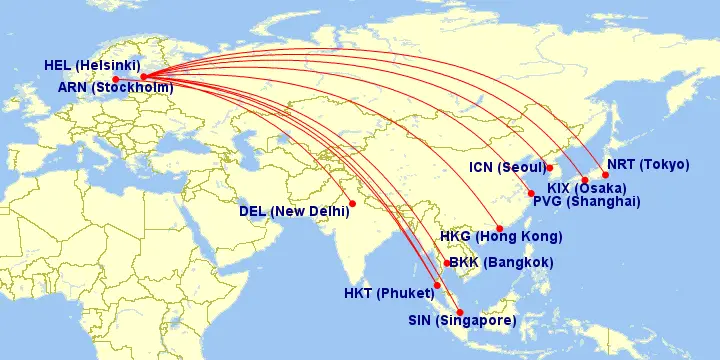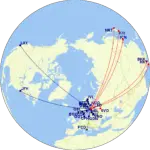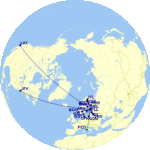Finnair, Finland’s national carrier, has withdrawn its earnings guidance to investors for the next quarter and the half-year ended next quarter. The announcement was made this Monday, following the weekend developements in the Russia-Ukraine war and subsequent airspace closures.
With European Union countries closing down to Russian airlines – and Russia retaliating, Finnair’s long-haul network, which naturally would fly over Russia, is fundamentally crippled. The airline reckoned, in the notice to investors, that «the potential Russian airspace closure would notably impact air traffic between Europe and Asia, which plays an important role in Finnair’s network.»
Although Finland still hasn’t closed the airspace to Russia, the country’s Transport and Communications Minister, Timo Harakka, has announced the Nordic nation intends doing so two days ago.
Suomi valmistautuu ilmatilan sulkemiseen venäläiseltä lentoliikenteeltä. 🇫🇮🇺🇦
— Timo Harakka 🏳️🌈🇫🇮🇺🇦 Äänekosken Huima (@TimoHarakka) February 26, 2022
With that, a Russian retaliation would be natural, and the airline reckons «the negative financial impacts on Finnair will be significant especially if the situation prolongs».
“The crisis in Ukraine touches all Europeans, and we understand the EU’s decision to close its airspace», said Finnair’s CEO, Topi Manner, in the release. «We are implementing our contingency plan as the situation has a considerable impact on Finnair. Bypassing the Russian airspace lengthens flight times to Asia considerably and, thus, the operation of most our passenger and cargo flights to Asia is not economically sustainable or competitive”, he added.
The airline added that it is «currently preparing new traffic and cost savings plans in case the situation prolongs».
According to data by Cirium’s Diio Mi application, all of Finnair’s Asia flying – comprising routes to nine destinations – passes over Russian airspace — and most would require very inconvenient deviations from the Great Circle routing if they avoided Russia.

In a LinkedIn post, Manner got as far as saying that «due to our Asia focus we are the hardest hit of European airlines», although he showed support to the measures European countries are inflicting over Russia, stating that «there is […] something bigger at stake now in Europe».
Indeed, Finnair hinted in the release that losing the Asian markets would bring more cash burn to the airline, but besides guaranteeing that Finnair has a secure liquidity position to endure another major crisis like this, «the company is considering different solutions in case the situation prolongs, and it has an active dialogue with the State of Finland”. Whether this means more state aid is unclear.
According to the previous week’s filings on Cirium, Finnair’s Asia network comprised of 377 flights in March (5.3% of Finnair’s 7,169 operations), with 116,185 seats on offer (10.7% of 1,085,441) and over 900 million ASKs (32.8% of 2.7 billion). That is: if the Asia flights have to be canceled, it would be as if Finnair lost a third of its capacity over night.
And the way hub-and-spoke networks work, other flights will naturally struggle with a weakened long-haul network.
Take flight AY1762 from Rome/Fiumicino on March the 2nd, for instance. Of the 24 possible connections, eight would fly over – or go to – Russia, according to Cirium.
















